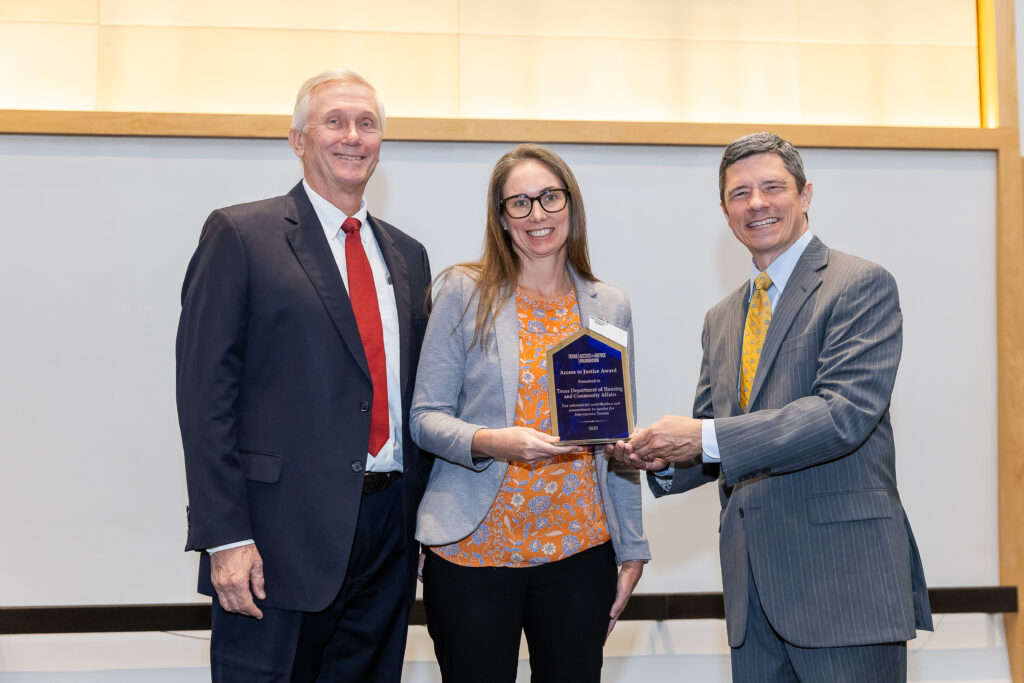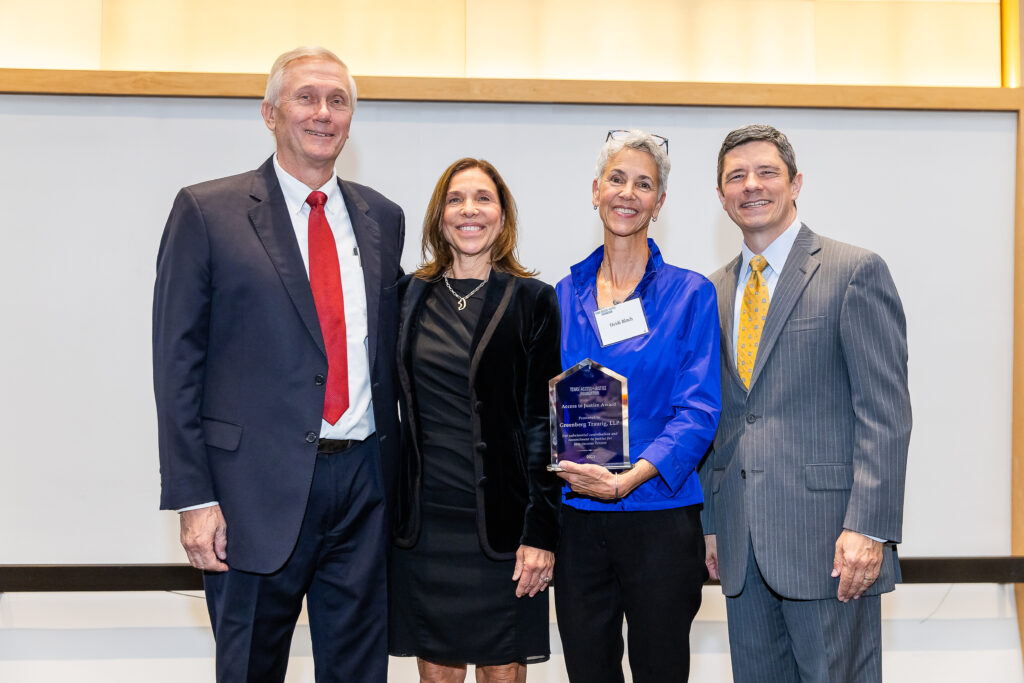A father needing to prove ownership of his RV home after the July 4 floods. A small-town West Texas woman facing long odds in her domestic violence claims against a well-connected man. A veteran and single father overcoming personal challenges to gain benefits and restore his life.
These cases were highlighted by legal services lawyers during the Texas Access to Justice Foundation’s luncheon with the Supreme Court on Oct. 20. The foundation is the primary state-based funding source for civil legal aid in Texas.

Justice Brett Busby, the court’s liaison for access to justice, said it is important to focus attention on the impact of helping Texans access the justice system.
“The stories about the actual providers who are doing the work and the people, the real Texans, that they’re helping really emphasizes the importance of legal aid and the grants that the Texas Access to Justice Foundation provides, and being able to continue doing that, because it really does make a huge difference in the lives of Texans all over the state,” Busby said.
“It’s great for people to hear the concrete examples of that and then be able to go out and either take a pro bono case or help advocate for additional funding so that we can help more Texans who really need it,” he added.
Busby told The Lawbook that the court remains focused on allowing paralegals and other non-attorney professionals to provide certain legal services “that aren’t something where you would need to go to three years of law school to understand what the right way to help people with that is.”
He said the court is looking at revisions to proposed rules on legal paraprofessionals, taking into consideration feedback from legislators and comments received from lawyers and the public.
“The court, as the regulator of the legal profession, is really focused on that, to try to be sure that we’re looking at all the options to increase the supply of legal services for Texans that need it,” Busby said.
Busby presented this year’s Access to Justice Award to Greenberg Traurig and the Texas Department of Housing & Community Affairs. The law firm has co-sponsored a post-graduate fellowship program with TAJF for 15 years. The housing department has worked with the foundation since the pandemic on legal services essential to keeping Texans housed.
“Legal aid provides more than just legal help. It offers peace of mind, stability and a path forward for families facing hardship,” said Betty Balli Torres, executive director of TAJF. “Thanks to the dedication of today’s honorees, more Texans have the support they need to face legal challenges and move toward a more secure future.”
Robert Doggett of Texas RioGrande Legal Aid told attendees about ongoing efforts to help victims of the July 4 floods in Kerr County. He said about 1,200 lawyers have signed up to help individuals like Justin Brown, whose RV home was washed away. Legal aid helped him prove ownership of the vehicle to receive $35,000 in federal disaster benefits.
Others needed help accessing funds of deceased relatives, applying for unemployment, and navigating debt management and bankruptcy.
“Each of these stories, each of these survivors, have a legal problem, but it’s really a barrier to their survival. And that’s where legal aid comes in,” said Doggett.

Kay Caballero of Family Legal Services of the South Plains talked about efforts to help survivors of family violence and sexual assault. She recounted going to court with one of her attorneys, Rebecca Luna, to represent a woman who had fled her home with her young child after being choked in bed by her husband.
The woman began divorce proceedings, and the lawyers filed for a protective order and temporary restraining order. Caballero said she was surprised to see a courtroom filled with people willing to serve as character witnesses for the husband, a town hero who had created the local youth football team.
She said the husband’s efforts backfired when he took the witness stand and bristled at questions from the lawyers.
“The fact that three women at this table had the audacity to question his motives made him a little upset. He was using foul language, which didn’t do anything but help us. And in the end, it was obvious who was the winner,” Caballero said.
Zoe Dobkin, an Equal Justice Works fellow, spoke about a medical-legal partnership between the VA in Austin and the Texas Legal Services Center.
“The idea behind the partnership is that, many times, health care professionals are treating the symptoms of something that is ultimately a legal issue. By co-locating resources and having a lawyer on site, health service providers can conveniently refer patients to a lawyer to resolve the root problem, the legal issue,” Dobkin said.
“I’ve been able to prevent veterans from being evicted through representing them in JP court and negotiating settlements. I was able to get $1,000 in fines dismissed against a veteran who fell behind on car insurance payments when he was homeless. I’ve also assisted veterans with drafting divorce decrees and defending against debt collection lawsuits. In addition, I give veterans peace of mind by assisting them with drafting documents for end-of-life and estate planning,” she said.
“I am honored that this fellowship has given me the opportunity to serve veterans, because they put their lives on the line to protect our country.”
